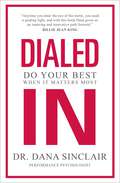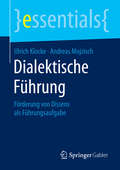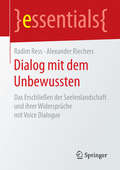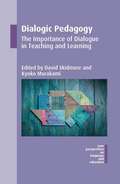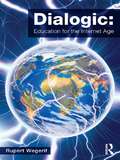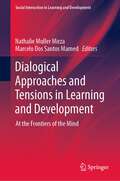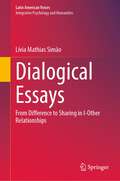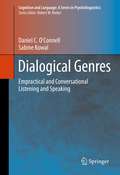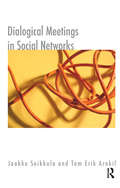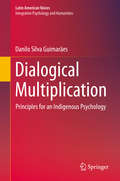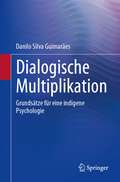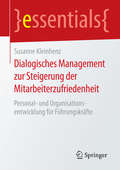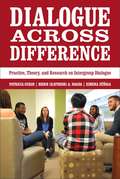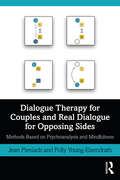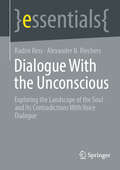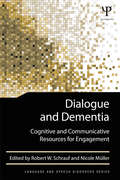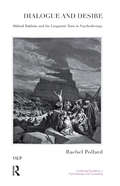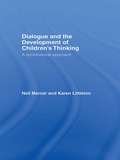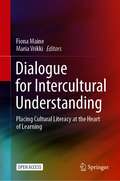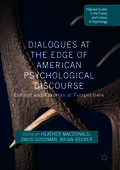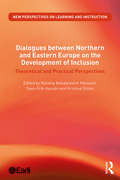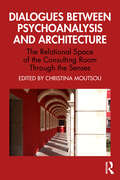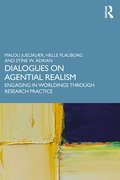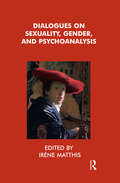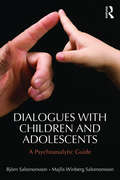- Table View
- List View
Dialed In: Do Your Best When It Matters Most
by Dr. Dana SinclairFor readers of Atomic Habits and Grit, a top performance psychologist, who has coached elite athletes, surgeons, and business leaders, shares her proven plan to getting the best results when the pressure is on.What do a major league baseball catcher struggling with pop ups, an operating room doctor tense before a surgery, and a slumping sixteen-year-old tennis prodigy all have in common? They&’re elite performers who are not achieving excellence, and they&’re not sure how to improve. Enter Dr. Dana Sinclair. For more than twenty years, Dr. Dana has worked with the best of the best to improve results, from NFL, MLB, NBA, and NHL teams to IndyCar drivers and Olympic athletes. She helps performers shift their focus and deliver optimal performance in high-pressure moments that define greatness. Her methods also work for students and teachers, business leaders and managers—anyone motivated to improve. Her approach is simple: figure out what gets in your way, develop actions to address it in the moment, and then stick to the plan. It&’s not about how you feel, it&’s about what you do! Now, for the first time, her method to improve performance is available to everyone. In Part One of Dialed In, Dr. Dana shares her key concepts: -the true nature of confidence (it&’s overrated) -the difference between good routines and unhelpful superstitions -good communicating vs. common bad advice -why character is better than talent, and much more In Part Two, she takes us through her three-step process for making your own performance plans, with five helpful examples to illustrate how it&’s done. There are also leading questions and quick tips to help you better develop your personalized performance plan for whatever challenges you face. Simple, smart, and effective, Dialed In is like having your own performance coach in your back pocket.
Dialektische Führung: Förderung von Dissens als Führungsaufgabe (essentials)
by Ulrich Klocke Andreas MojzischUlrich Klocke und Andreas Mojzisch stellen mit der dialektischen Führung einen neuen Ansatz vor, bei dem Führungskräfte Dissens in ihrem Team fördern, um Entscheidungen zu verbessern. Auf der Basis von Führungs- und Gruppenforschung sowie aktuellen Fallbeispielen liefert das Essential konkrete Verhaltensempfehlungen, wie ührungskräfte dabei vorgehen sollten, damit der Dissens nicht zu Konflikten auf der Beziehungsebene führt und am Ende alle Beteiligten die getroffene Entscheidung akzeptieren.
Dialog mit dem Unbewussten: Das Erschließen der Seelenlandschaft und ihrer Widersprüche mit Voice Dialogue (essentials)
by Alexander Riechers Radim RessDie Autoren stellen eine Neufassung des Voice Dialogue vor, die an das Gedankengut C. G. Jungs ankn#65533;pft und der direkten Ansprache des Unbewussten dient. Sie zeigen, wie das Unbewusste sich infolge Existenzieller Grenzerfahrungen eines Menschen und seiner Ahnen als Innere Gestalten abbildet. Diese sind Tr#65533;ger und Beweger der Pers#65533;nlichkeit und werden als unbewusste Grundlage zur Vorlage f#65533;r unsere pers#65533;nlichen Schicksalsmuster. Voice Dialogue leitet vom bewusstseinszentrierten Einheitsmodell zum Vielheitsmodell der Seele #65533;ber und erschlie#65533;t die verborgene Hierarchie der Macht im Unbewussten. Das Dialogische Miteinander hilft, die Inneren Gestalten mit Bewusstsein zu durchdringen und den Widerspr#65533;chlichkeiten, Zw#65533;ngen und Z#65533;gen unserer Pers#65533;nlichkeit auf den Grund zu gehen. So bietet die Methode einen Weg zu mehr innerer Freiheit.
Dialogic Pedagogy: The Importance of Dialogue in Teaching and Learning
by Kyoko Murakami David SkidmoreThis book provides a wide-ranging and in-depth theoretical perspective on dialogue in teaching. It explores the philosophy of dialogism as a social theory of language and explains its importance in teaching and learning. Departing from the more traditional teacher-led mode of teacher-student communication, the dialogic approach is more egalitarian and focuses on the discourse exchange between the parties. Authors explore connections between dialogic pedagogy and sociocultural learning theory, and argue that dialogic interaction between teacher and learners is vital if instruction is to lead to cognitive development. The book also presents prosody as a critical resource for understanding between teachers and students, and includes some of the first empirical studies of speech prosody in classroom discourse.
Dialogic: Education For The Internet Age
by Rupert WegerifDialogic: Education for the Internet Age argues that despite rapid advances in communications technology, most teaching still relies on traditional approaches to education, built upon the logic of print, and dependent on the notion that there is a single true representation of reality. In practice, the use of the Internet disrupts this traditional logic of education by offering an experience of knowledge as participatory and multiple. This new logic of education is dialogic and characterises education as learning to learn, think and thrive in the context of working with multiple perspectives and ultimate uncertainty. The book builds upon the simple contrast between observing dialogue from an outside point of view, and participating in a dialogue from the inside, before pinpointing an essential feature of dialogic: the gap or difference between voices in dialogue which is understood as an irreducible source of meaning. Each chapter of the book applies this dialogic thinking to a specific challenge facing education, re-thinking the challenge and revealing a new theory of education. Areas covered in the book include: dialogical learning and cognition dialogical learning and emotional intelligence educational technology, dialogic ‘spaces’ and consciousness global dialogue and global citizenship dialogic theories of science and maths education The challenge identified in Wegerif’s text is the growing need to develop a new understanding of education that holds the potential to transform educational policy and pedagogy in order to meet the realities of the digital age. Dialogic: Education for the Internet Age draws upon the latest research in dialogic theory, creativity and technology, and is essential reading for advanced students and researchers in educational psychology, technology and policy.
Dialogical Approaches and Tensions in Learning and Development: At the Frontiers of the Mind (Social Interaction in Learning and Development)
by Nathalie Muller Mirza Marcelo Dos Santos MamedThe book pursues the goal of exploring and strengthening a dialogical approach of communication and cognition. It brings together contributions from world-leading researchers related to the dialogical approach in education and psychology. It presents, among others, the place of language and materiality in the development of communication and thinking, as well as the role of the methods in the relationship between researchers and participants. This leads to an innovative definition of the dialogicality and how a dialogical approach can provide heuristic (conceptual and methodological) tools to better understand how people think, communicate and learn in a complex world.The authors hereby develop an epistemological framework inspired by scholars such as Michaïl Bakhtin, Lev Vygotsky and Herbert Mead under the assumption that dialogue, or dialogicality - and therefore the presence of the other – is fundamentally entangled into the human thinking and development.This book contributes to the understanding of human communication, cognition and mind, and participates in a scientific dialogue which helps to advance future research. It includes theoretical and empirical chapters and presents innovative methods of inquiry, which makes it a useful tool for both teaching and research.
Dialogical Essays: From Difference to Sharing in I-Other Relationships (Latin American Voices)
by Lívia Mathias SimãoThis book presents a collection of interrelated essays that analyze the theoretical foundations of semiotic-cultural constructivism in psychology written by one of the pioneers in this field of research: Dr. Lívia Mathias Simão, senior professor at the Institute of Psychology of the University of São Paulo, Brazil. In each of the five essays included in this book, the author establishes a dialogue with key thinkers and intellectual traditions of dialogical approaches arriving at core points of I-other relationships according to the perspective of semiotic-cultural constructivism in psychology.The first essay establishes a dialogue with Greek philosophers such as Parmenides and Aristotle. In the second essay this dialogue is established with semiotic-constructivist psychologists such as Jaan Valsiner, Ragnar Rommetveit and Ivana Marková. The third essay is a dialogue with the contributions of Ernst Boesch’s symbolic action theory. The fourth essay proposes a dialogue between semiotic-cultural constructivists and Hans-Georg Gadamer’s hermeneutics. Finally, the fifth essay proposes how the philosophy of Emmanuel Levinas contributes to dialogical studies of I-other in the context of semiotic-cultural constructivism.Originally published in Portuguese for the Brazilian market, Dialogical Essays: From Difference to Sharing in I-Other Relationships is now published in English in an international edition that will be of interest to psychologists, philosophers, historians and other human and social scientists interested in epistemological, ontological and ethical aspects of I-other relationships from the perspective of semiotic-cultural constructivism and cultural psychology.
Dialogical Genres
by Sabine Kowal Daniel C. O'ConnellThis work gives a thorough revision of history through a psychological approach to verbal interaction between listeners and speakers. This book offers a large amount of information on the psychology of language and on psycholinguistics, and focuses on a new direction for a psychology of verbal communication. Empirical research includes media interviews, public speeches, and dramatic performances.
Dialogical Meetings in Social Networks (The Systemic Thinking and Practice Series)
by Tom Erik ArnkilThis book describes and analyses two dialogic network practices: 'Open Dialogues' - developed for use in psychiatric crisis situations - and 'Anticipation Dialogues' - used in less acute situations such as multi-agency muddles where the helper systems are stuck. The book is both theoretical and detailed enough for practitioners who wish to apply the approaches to their work. It is meant for professionals in the fields of psycho-social work - including therapists to day care personnel, social workers to school teachers, - researchers, and academics. As the book touches upon dialogues with and within private networks, the book reaches out to clients, too.
Dialogical Multiplication: Principles for an Indigenous Psychology (Latin American Voices)
by Danilo Silva GuimarãesThis book presents a theoretical framework developed to support psychologists working with indigenous people and interethnic communities. Departing from the cultural shock experienced as a psychologist working with indigenous people in Brazil, Dr. Danilo Silva Guimarães identifies the limits of traditional psychological knowledge to deal with populations who don’t share the same ethos of the European societies who gave birth to psychology as a modern science and proposes a new approach to go beyond the epistemological project that aimed to construct a subject able to represent the world free from any cultural mediation. According to the author, the purpose of cultural psychology is to produce general psychological theories about the cultural mediation of the self, others and world relationships. Based on this assumption, he argues that to achieve this aim, cultural psychology needs to understand how indigenous perspectives participate in the process of knowledge construction, transforming psychological conceptions and practices. In this volume, the author presents his own contribution to open cultural psychology to indigenous perspectives by discussing the theoretical and practical implications of the notion of dialogical multiplication for the construction of work in co-authorship in the relation between psychology and indigenous peoples. With the growing migrations around the world, competences in psychological communication across cultures are more demanded each day, which makes Dialogical Multiplication – Principles for an Indigenous Psychology a critical resource for psychologists working with interethnic and intercultural communities around the world.
Dialogische Multiplikation: Grundsätze für eine indigene Psychologie
by Danilo Silva GuimarãesDieses Buch stellt einen theoretischen Rahmen vor, der zur Unterstützung von Psychologen entwickelt wurde, die mit indigenen Völkern und interethnischen Gemeinschaften arbeiten. Ausgehend von dem Kulturschock, den er als Psychologe bei der Arbeit mit indigenen Völkern in Brasilien erlebte, zeigt Dr. Danilo Silva Guimarães die Grenzen des traditionellen psychologischen Wissens im Umgang mit Bevölkerungsgruppen auf, die nicht dasselbe Ethos der europäischen Gesellschaften teilen, aus denen die Psychologie als moderne Wissenschaft hervorging, und schlägt einen neuen Ansatz vor, um über das erkenntnistheoretische Projekt hinauszugehen, das darauf abzielte, ein Subjekt zu konstruieren, das die Welt frei von jeglicher kulturellen Vermittlung darstellen kann. Nach Ansicht des Autors besteht das Ziel der Kulturpsychologie darin, allgemeine psychologische Theorien über die kulturelle Vermittlung des Selbst, der anderen und der Beziehungen zur Welt aufzustellen. Ausgehend von dieser Annahme argumentiert er, dass die Kulturpsychologie, um dieses Ziel zu erreichen, verstehen muss, wie indigene Perspektiven am Prozess der Wissenskonstruktion teilnehmen und psychologische Konzepte und Praktiken verändern. In diesem Band stellt der Autor seinen eigenen Beitrag zur Öffnung der Kulturpsychologie für indigene Perspektiven vor, indem er die theoretischen und praktischen Implikationen des Begriffs der dialogischen Multiplikation für die Konstruktion von Arbeit in Ko-Autorenschaft in der Beziehung zwischen Psychologie und indigenen Völkern diskutiert. Mit den wachsenden Migrationsbewegungen auf der ganzen Welt werden Kompetenzen in der psychologischen Kommunikation über Kulturen hinweg immer mehr gefordert. Dies macht Dialogische Multiplikation - Prinzipien für eine indigene Psychologie zu einer wichtigen Ressource für Psychologen, die mit interethnischen und interkulturellen Gemeinschaften auf der ganzen Welt arbeiten.
Dialogisches Management zur Steigerung der Mitarbeiterzufriedenheit: Personal- und Organisationsentwicklung für Führungskräfte (essentials)
by Susanne KleinhenzDieses Buch befasst sich mit dem Zusammenhang von Mitarbeiterzufriedenheit und der psychologischen Präferenz von Führungskräften. Es widmet sich der Erhöhung der Mitarbeiterzufriedenheit durch Einführung eines Dialogischen Managements. Im Mittelpunkt steht daher die praxisnahe Implementierung eines Dialogischen Managements in Abhängigkeit der psychologischen Präferenz der jeweiligen Führungskräfte. Hierbei werden insbesondere Organisations- und Personalentwicklungsmodelle umsetzungsnah besprochen. Der Leser erfährt, in welcher Situation er welche Methode einsetzen kann und unter welchen Voraussetzungen Methoden effektiv und effizient die gewünschten Veränderungen bewirken können.
Dialogue Across Difference: Practice, Theory, and Research on Intergroup Dialogue
by Patricia Gurin Ximena Zuniga Biren Ratnesh NagdaDue to continuing immigration and increasing racial and ethnic inclusiveness, higher education institutions in the United States are likely to grow ever more diverse in the 21st century. This shift holds both promise and peril: Increased inter-ethnic contact could lead to a more fruitful learning environment that encourages collaboration. On the other hand, social identity and on-campus diversity remain hotly contested issues that often raise intergroup tensions and inhibit discussion. How can we help diverse students learn from each other and gain the competencies they will need in an increasingly multicultural America? Dialogue Across Difference synthesizes three years’ worth of research from an innovative field experiment focused on improving intergroup understanding, relationships and collaboration. The result is a fascinating study of the potential of intergroup dialogue to improve relations across race and gender. First developed in the late 1980s, intergroup dialogues bring together an equal number of students from two different groups – such as people of color and white people, or women and men – to share their perspectives and learn from each other. To test the possible impact of such courses and to develop a standard of best practice, the authors of Dialogue Across Difference incorporated various theories of social psychology, higher education, communication studies and social work to design and implement a uniform curriculum in nine universities across the country. Unlike most studies on intergroup dialogue, this project employed random assignment to enroll more than 1,450 students in experimental and control groups, including in 26 dialogue courses and control groups on race and gender each. Students admitted to the dialogue courses learned about racial and gender inequalities through readings, role-play activities and personal reflections. The authors tracked students’ progress using a mixed-method approach, including longitudinal surveys, content analyses of student papers, interviews of students, and videotapes of sessions. The results are heartening: Over the course of a term, students who participated in intergroup dialogues developed more insight into how members of other groups perceive the world. They also became more thoughtful about the structural underpinnings of inequality, increased their motivation to bridge differences and intergroup empathy, and placed a greater value on diversity and collaborative action. The authors also note that the effects of such courses were evident on nearly all measures. While students did report an initial increase in negative emotions – a possible indication of the difficulty of openly addressing race and gender – that effect was no longer present a year after the course. Overall, the results are remarkably consistent and point to an optimistic conclusion: intergroup dialogue is more than mere talk. It fosters productive communication about and across differences in the service of greater collaboration for equity and justice. Ambitious and timely, Dialogue Across Difference presents a persuasive practical, theoretical and empirical account of the benefits of intergroup dialogue. The data and research presented in this volume offer a useful model for improving relations among different groups not just in the college setting but in the United States as well.
Dialogue Therapy for Couples and Real Dialogue for Opposing Sides: Methods Based on Psychoanalysis and Mindfulness
by Polly Young-Eisendrath Jean PieniadzA clear, cogent, and comprehensive account of the rationale and methods of Dialogue Therapy and Real Dialogue, this volume introduces models of facilitated dialogue designed specifically to end polarization. This book offers a straightforward and comprehensive encounter with some of the most effective theories and methods to facilitate dialogue and disrupt deadening power struggles between life partners, grown children and parents, siblings, co-workers, and others whose conflicts have led to harmful polarizations. The book is based on ideas and relational models from mindfulness and psychoanalysis that have not been applied in this unique way before. This melding of mindfulness (containment, concentration, equanimity, maintaining a "mindful gap") with the psychoanalytic understanding of projection and projective identification (the "hijacking" of our subjective experiences) creates much more than light at the end of the tunnel. It engenders the acceptance of another that leads to love and insight, based on the recognition and acknowledgement of our autonomy and our common humanity in the midst of conflict. This book introduces a new, revolutionary model for couple therapists, life coaches, group facilitators, and leaders to open a mindful space that increases witnessing capacities in the midst of emotional conflict without imposing goals of agreement, reconciliation or compromise.
Dialogue With the Unconscious: Exploring the Landscape of the Soul and Its Contradictions With Voice Dialogue (essentials)
by Radim Ress Alexander N. RiechersThe authors present a new version of Voice Dialogue that draws on the ideas of C.G. Jung and serves as a direct address to the unconscious. They demonstrate how the unconscious manifests as inner shapes in response to existential limit-experiences of an individual and their ancestors. These shapes are the carriers and movers of the personality and form the unconscious basis for our personal patterns of fate. Voice Dialogue leads from a consciousness-centered unity model to the multiplicity model of the soul, revealing the hidden power hierarchy in the unconscious. Dialogical togetherness helps to infuse the inner shapes with consciousness and to explore the contradictions, compulsions, and traits of our personality. Thus, the method offers a path to greater inner freedom.
Dialogue and Dementia: Cognitive and Communicative Resources for Engagement
by Martin J. Ball Nicole Müller Robert W. Schrauf Jack S. DamicoThis volume takes the positive view that conversation between persons with dementia and their interlocutors is a privileged site for ongoing cognitive engagement. The book aims to identify and describe specific linguistic devices or strategies at the level of turn-by-turn talk that promote and extend conversation, and to explore real-world engagements that reflect these strategies. Final reflections tie these linguistic strategies and practices to wider issues of the "self" and "agency" in persons with dementia. Thematically, the volume fosters an integrated perspective on communication and cognition in terms of which communicative resources are recognized as cognitive resources, and communicative interaction is treated as reflecting cognitive engagement. This reflects perspectives in cognitive anthropology and cognitive science that regard human cognitive activity as distributed and culturally rooted. This volume is intended for academic researchers and advanced students in applied linguistics, linguistic and medical anthropology, nursing, and social gerontology; and practice professionals in speech-language pathology and geropsychology.
Dialogue and Desire: Mikhail Bakhtin and the Linguistic Turn in Psychotherapy
by Rachel PollardThis book is an exploration of the relationship between the Russian philosopher, Mikhail Bakhtin, and contemporary dialogical psychotherapy, describing the psychoanalytic and linguistic conception of the dialogical self.
Dialogue and the Development of Children's Thinking: A Sociocultural Approach
by Neil Mercer Karen LittletonThis book draws on extensive research to provide a ground-breaking new account of the relationship between dialogue and children’s learning development. It closely relates the research findings to real-life classrooms, so that it is of practical value to teachers and students concerned that their children are offered the best possible learning opportunities. The authors provide a clear, accessible and well-illustrated case for the importance of dialogue in children's intellectual development and support this with a new and more educationally relevant version of socio-cultural theory, which explains the fascinating relationship between dialogues and learning. In educational terms, a sociocultural theory that relates social, cultural and historical processes, interpersonal communication and applied linguistics, is an ideal way of explaining how school experience helps children learn and develop. By using evidence of how the collective construction of knowledge is achieved and how engagement in dialogues shapes children's educational progress and intellectual development, the authors provide a text which is essential for educational researchers, postgraduate students of education and teachers, and is also of interest to many psychologists and applied linguists.
Dialogue for Intercultural Understanding: Placing Cultural Literacy at the Heart of Learning
by Fiona Maine Maria VrikkiThis open access book is a result of an extensive, ambitious and wide-ranging pan-European project focusing on the development of children and young people’s cultural literacy and what it means to be European in the 21st century prioritising intercultural dialogue and mutual understanding. The Horizon 2020 funded, 3-year DIalogue and Argumentation for cultural Literacy Learning (DIALLS) project included ten partners from countries in and around Europe with the aim to centralise co-constructive dialogue as a main cultural literacy value and to promote tolerance, empathy and inclusion. This is achieved through teaching children in schools from a young age to engage together in discussions where they may have differing viewpoints or perspectives, to enable a growing awareness of their own cultural identities, and those of others. Central to the project is children’s engagement with wordless picture books and films, which are used as stimuli for discussions around core cultural themes such as social responsibility, living together and sustainable development. In order to enable intercultural dialogue in action, the project developed an online platform as a tool for engagement across classes, and which this book elaborates on.The book explores themes underpinning this unique interdisciplinary project, drawing together scholars from cultural studies, civics education and linguistics, psychologists, socio-cultural literacy researchers, teacher educators and digital learning experts. Each chapter of the book explores a theme that is common to the project, and celebrates its interdisciplinarity by exploring these themes through different lenses.
Dialogues at the Edge of American Psychological Discourse
by David Goodman Brian Becker Heather MacdonaldBelow we have provided very simple written essay and speech on the Mahatma Gandhi, a person who would always live in the heart of everyone. Every kid and children of the India know him by the name of Bapu or Father of the Nation. Using this you can help your kids and school going children to write essay or recite speech on the Mahatma Gandhi in their school
Dialogues between Northern and Eastern Europe on the Development of Inclusion: Theoretical and Practical Perspectives (New Perspectives on Learning and Instruction)
by Natallia Bahdanovich HanssenThe concepts of inclusion and inclusive education for children with special education needs (SEN) have been widely accepted as imperative undertakings in the education spectrum. This book posits the practice of these ideas by scrutinizing the methodologies adopted by varied nations of the two regions towards inclusive education along with juxtaposing the dichotomous observations to enable a dialogue regarding the actualization of inclusive education. The book looks at the distinct approaches taken by Northern and Eastern European education systems to realize inclusive education for children with SEN and aims to enable a space for dialogue wherein the reader would be able to access the cultural context of each practice, expand their cognizance regarding the concept of inclusivity and develop a more nuanced and sensitive approach to inclusive education. In the act of exploring the myriad ways in which inclusivity is practiced in the two regions, the book thusly provides insights into the pluralities and significance of inclusion in the education sector across a global spectrum. The anthology will be of interest to a vast range of audience, videlicet, individuals, students, researchers, professionals, et al., invested in the education sector, special needs education and pedagogy. It further proposes appeal for individuals interested in performing scientific research on the subject. The book practically aims to be of interest for any individual invested in the discipline of education, development of community and the topics pertaining to education for children with SEN.
Dialogues between Psychoanalysis and Architecture: The Relational Space of the Consulting Room Through the Senses
by Christina MoutsouDialogues between Psychoanalysis and Architecture explores the multisensory space of therapy, real or virtual, and how important it is in providing the container for the therapeutic relationship and process. This book is highly original in bringing psychoanalysis and architecture together and highlighting how both disciplines strive to achieve transformation of our psychic space. It brings together contributions that comprise three parts: the first explores the space of the consulting room through the senses to examine issues such as smell and its link with memory and belonging, hearing out the Other, the psychoanalytic couch, the medical therapy room and the so-called sixth sense; secondly, the book questions how the consulting room can represent or be redesigned to reflect the philosophy that underlies the therapy process, foregrounding an architectural point of view; and thirdly, the book attends to the significance of the consulting room as a virtual space, as it emerged during the pandemic of COVID-19 and beyond. Architectural, psychotherapeutic and interdisciplinary perspectives allow for an important new dimension on the psychological use of space, and will appeal to psychoanalysts, psychoanalytic and integrative psychotherapists, art therapists, students of psychotherapy, as well as architects and designers.
Dialogues on Agential Realism: Engaging in Worldings through Research Practice
by Malou Juelskjær Helle Plauborg Stine W. AdrianDialogues on Agential Realism is built up around dialogues with key scholars in the field: Magdalena Górska, Astrid Schrader, Elizabeth de Freitas, Ericka Johnson and Karen Barad. The book investigates agential realist-inspired research practices and provides illustrations of what response-able knowledge production may involve. Based on thorough readings of the scholars’ work, careful dialogues concerning the challenges, messiness, thrill and inventiveness of research processes are brought to the fore. The dialogues with Górska, Schrader, de Freitas and Johnson were based on specific research projects, which drew inspiration from agential realist theory, in combination with the ideas of other thinkers. The dialogue with Barad focuses on the continuous development of agential realism. In addition, the book consists of a chapter that introduces agential realism and a closing chapter focusing on some of the main insights agential realism has to offer in relation research practices. The book offers new entry points to agential realism and the conduct of research. It may vitalize methodological prudence and creativity and spark new and previously unimagined ways of thinking and doing research. As such, it will be an essential resource to both newcomers and scholars and students who are already familiar with the theory of agential realism.
Dialogues on Sexuality, Gender and Psychoanalysis
by Irene Matthis'There are more questions than answers in this book - questions that are important and will continue to intrigue us. This book will be needed to remind us of the different opinions and to help us create tomorrow's theories. Human experience cannot be reduced to sexuality, but there is sexuality in everything human.'- From the Introduction A challenging exploration of contemporary theories on femininity with cutting-edge papers from leading analysts, this volume presents a thought-provoking dialogue on femininity, sexuality, gender and masculinity. These key issues are analysed and discussed in new and stimulating ways, whilst familiar concepts are dissected and dismantled to bring forward fresh ideas. The diversity and developments currently advancing studies on femininity towards new understandings are shown clearly throughout. This rich and inspiring collection of papers grew from the "Sexuality and Gender" conference held in Sweden in 2002, organised by the Committee on Women and Psychoanalysis. The conference was created with the conscious intent of bringing different ideas to bear upon each other in order to promote further research into this vital area.
Dialogues with Children and Adolescents: A Psychoanalytic Guide
by Björn Salomonsson Majlis Winberg-SalomonssonPsychoanalytic work with children is popular, but the sophisticated language used in psychoanalytic discourse can be at odds with how children communicate, and how best to communicate with them. Dialogues with Children and Adolescents: A Psychoanalytic Guide shows how these aims can be achieved for the most effective clinical outcome with children from infancy up to late adolescence. Björn Salomonsson and Majlis Winberg Salomonsson draw on extensive case material which reveals the essence of communication between child and therapist. They enfranchise the patient of all ages as an equal participant in the therapeutic relationship. Presented in letter form the cases contain no professional terms. Only the final chapter contains theoretical commentaries applicable to each case. These terms and theories help to explain a child’s behaviour, the analyst’s technique and the background to the disorder. This is new creative development in child therapy and analysis which is written in a very accessible style. Dialogues with Children and Adolescents will be essential reading for beginners in psychoanalytic work with children and will cast a fresh light on such work for more experienced clinicians. It will also appeal to the non-professional lay reader.
